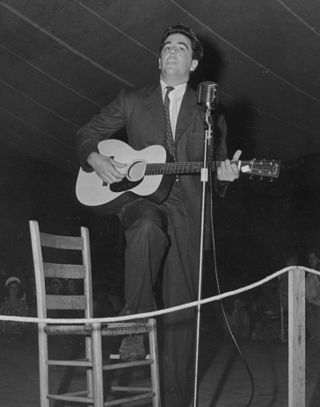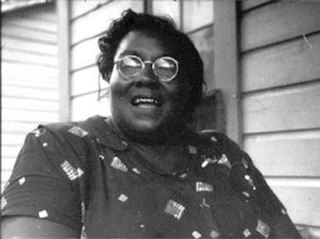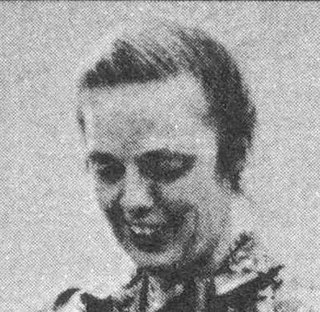Related Research Articles

Huddie William Ledbetter, better known by the stage name Lead Belly, was an American folk and blues singer notable for his strong vocals, virtuosity on the twelve-string guitar, and the folk standards he introduced, including his renditions of "In the Pines", "Goodnight, Irene", "Midnight Special", "Cotton Fields", and "Boll Weevil".

James Henry Miller, better known by his stage name Ewan MacColl, was a folk singer-songwriter, folk song collector, labour activist and actor. Born in England to Scottish parents, he is known as one of the instigators of the 1960s folk revival as well as for writing such songs as "The First Time Ever I Saw Your Face" and "Dirty Old Town".

Delta blues is one of the earliest-known styles of blues. It originated in the Mississippi Delta, and is regarded as a regional variant of country blues. Guitar and harmonica are its dominant instruments; slide guitar is a hallmark of the style. Vocal styles in Delta blues range from introspective and soulful to passionate and fiery.
Country blues is one of the earliest forms of blues music. The mainly solo vocal with acoustic fingerstyle guitar accompaniment developed in the rural Southern United States in the early 20th century. It stands in contrast primarily to the Urban blues style, especially in the pre-war era.

Alan Lomax was an American ethnomusicologist, best known for his numerous field recordings of folk music of the 20th century. He was also a musician himself, as well as a folklorist, archivist, writer, scholar, political activist, oral historian, and film-maker. Lomax produced recordings, concerts, and radio shows in the US and in England, which played an important role in preserving folk music traditions in both countries, and helped start both the American and British folk revivals of the 1940s, 1950s, and early 1960s. He collected material first with his father, folklorist and collector John Lomax, and later alone and with others, Lomax recorded thousands of songs and interviews for the Archive of American Folk Song, of which he was the director, at the Library of Congress on aluminum and acetate discs.
"Scarborough Fair" is a traditional English ballad. The song, which is a variant of The Elfin Knight, lists a number of impossible tasks given to a former lover who lives in Scarborough, North Yorkshire. The "Scarborough/Whittingham Fair" variant was most common in Yorkshire and Northumbria, where it was sung to various melodies, often using Dorian mode, with refrains resembling "parsley, sage, rosemary and thyme" and "Then she'll be a true love of mine." It appears in Traditional Tunes by Frank Kidson published in 1891, who claims to have collected it from Whitby.

John Avery Lomax was an American teacher, a pioneering musicologist, and a folklorist who did much for the preservation of American folk music. He was the father of Alan Lomax, John Lomax Jr. and Bess Lomax Hawes, also distinguished collectors of folk music.
Shirley Elizabeth Collins MBE is an English folk singer who was a significant contributor to the English Folk Revival of the 1960s and 1970s. She often performed and recorded with her sister Dolly, whose accompaniment on piano and portative organ created unique settings for Shirley's plain, austere singing style.
Ruby Terrill Lomax was an American educator and folklorist, who worked with her husband John A. Lomax to collect American folk songs, campaigned for women's education, and was Dean of Women at University of Texas at Austin.
The Archive of Folk Culture was established in 1928 as the first national collection of American folk music in the United States of America. It was initially part of the Music Division of the Library of Congress and now resides in the American Folklife Center.

Jean Ruth Ritchie was an American folk singer, songwriter, and Appalachian dulcimer player, called by some the "Mother of Folk". In her youth she learned hundreds of folk songs in the traditional way, many of which were Appalachian variants of centuries old British and Irish songs, including dozens of Child Ballads. In adulthood, she shared these songs with wide audiences, as well as writing some of her own songs using traditional foundations.

Mary Elizabeth Jones was an American gospel and folk singer credited with helping to bring folk songs, games and stories to wider audiences in the 20th century. Alan Lomax, who first encountered Jones on a field recording trip in 1959, said, "She was on fire to teach America. In my heart, I call her the Mother Courage of American Black traditions."

Adell Hall Ward, better known as Vera Hall was an American folk singer, born in Livingston, Alabama. Best known for her 1937 song "Trouble So Hard", she was inducted into the Alabama Women's Hall of Fame in 2005.
"Keep Your Eyes on the Prize" is a folk song that became influential during the American Civil Rights Movement of the 1950s and 1960s. It is based on the traditional song, "Gospel Plow," also known as "Hold On," "Keep Your Hand on the Plow," and various permutations thereof.
"Inside-Looking Out", often written "Inside Looking Out", is a 1966 single by the Animals, and their first for Decca Records. It was a moderate hit, reaching number 12 on the UK Singles Chart, number 23 in Canada, and number 34 in the United States on the U.S. pop singles chart. It was the group's final single with drummer John Steel, who left shortly after its release. He was replaced by Barry Jenkins, who would go on to play with Eric Burdon and the Animals.
"Take This Hammer" is a prison, logging, and railroad work song, which has the same Roud number as another song, "Nine Pound Hammer", with which it shares verses. "Swannanoa Tunnel" and "Asheville Junction" are similar. Together, this group of songs are referred to as "hammer songs" or "roll songs". Numerous bluegrass bands and singers like Scott McGill and Mississippi John Hurt also recorded commercial versions of this song, nearly all of them containing verses about the legendary railroad worker, John Henry; and even when they do not, writes folklorist Kip Lornell, "one feels his strong and valorous presence in the song".

Bess Lomax Hawes was an American folk musician, folklorist, and researcher. She was the daughter of John Avery Lomax and Bess Bauman-Brown Lomax, and the sister of Alan Lomax and John Lomax Jr.

Movin' It On is a live album by American folk singer Odetta, released in 1987. It is a recording of a concert at The Wisconsin Union Theatre, Madison, Wisconsin and was her first release in 12 years. It is out of print.
"The House of the Rising Sun" is a traditional folk song, sometimes called "Rising Sun Blues". It tells of a person's life gone wrong in the city of New Orleans. Many versions also urge a sibling or parents and children to avoid the same fate. The most successful commercial version, recorded in 1964 by the British rock band The Animals, was a number one hit on the UK Singles Chart and in the US and Canada. As a traditional folk song recorded by an electric rock band, it has been described as the "first folk rock hit".
The Southern Journey is the popular name given to a field-recording trip around the Southern States of the USA by the renowned ethnomusicologist Alan Lomax. He was accompanied on the trip by his then-lover, English folk singer Shirley Collins. It resulted in the first stereo field-recordings in the Southern United States, and is perhaps most noted for the 'discovery' of 'Mississippi' Fred McDowell. The music collected on the trip has had inestimable impact on the development of popular music. Tracks recorded on the trip were sampled by Moby for his Platinum-selling album Play. It also served as the inspiration for the soundtrack to the Coen Brothers' film O Brother Where Art Thou. The Southern Journey is the subject of a fascinating autobiography by Shirley Collins entitled 'America over the Water'. It is also the subject of s 2017 feature documentary, The Ballad of Shirley Collins. Lomax' own recollections of the trip were documented in his autobiography "The Land Where Blues Began", which won the National Book Award for Nonfiction in 1993.
References
- Ted Anthony, Chasing The Rising Sun: The Journey of an American Song, 2007
- Alan Lomax, The Folk Songs of North America, in the English Language, 1960
- 1 2 3 Anthony, Ted (September 17, 2000). "On Folkway, Highway, Song Rises Ever Anew". Los Angeles Times . Retrieved January 16, 2023.
- ↑ "The Life of a Song: 'The House of the Rising Sun'". www.ft.com. 2015-06-05. Retrieved 2020-10-28.